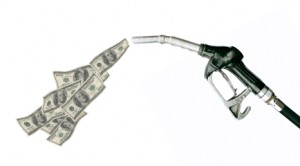The Oil Curse is a subset of the Resource Curse, describing an apparent paradox in developing countries “blessed with” large reserves of petroleum. The term refers to the political repression, corruption and violence that seem to accompany the development of oil resources in places like Nigeria.
 But that definition might need to stretch because we in the United States – still a top three global oil producer – are living our own Oil Curse. It’s the curse of addiction.
But that definition might need to stretch because we in the United States – still a top three global oil producer – are living our own Oil Curse. It’s the curse of addiction.
Our transportation system and its supporting infrastructure are the lifeblood of the American lifestyle (which I’m told is not negotiable) and they’re built from the ground up around oil: the roadside stations that keep cars and light trucks fueled, the tanker trucks that keep the stations supplied, the roads the tanker trucks travel on to and from the tank farms, the refineries that keep those tank farms filled, the pipelines snaking cross-country and tanker ships docking at specialized ports. Deeply woven over the past 100-plus years, it’s a blessing that’s evolving into a curse.
As we bump along the plateau of Peak Oil, supply becomes more difficult to maintain at a flow rate demanded by a constant-growth economic model. There is a clear need to move beyond petroleum. However, the influence of stakeholders heavily invested in, and greatly benefitting from, the current energy model creates a drag on innovation and transition. And to be clear, the stakeholders aren’t simply the major oil companies and the firms focused on exploration, extraction, refinement and delivery. They’re also us. And that’s our version of the Oil Curse.
Addiction creates dependence. From strip mall to skyscraper, cul-de-sac to office park, we all have an enormous personal stake in a business-as-usual energy model. There’s a reason that “drill, baby drill” made it onto bumper stickers nationwide. Adopting a new energy infrastructure is not as simple, or easy, as ditching a laptop for a tablet. It’s a big part of the reason that the current administration has placed its weight not only behind innovation in alternative and renewable energy sources, but also in a lot more drilling.
History shows that transitions from one type of energy infrastructure  – say wood to coal or coal to oil – takes decades. With the peak of conventional crude oil apparently already in our rearview mirror, the challenge in front of us is to reverse the curse. Hey, the Red Sox managed it. But we don’t have 86 years to figure it out.
– say wood to coal or coal to oil – takes decades. With the peak of conventional crude oil apparently already in our rearview mirror, the challenge in front of us is to reverse the curse. Hey, the Red Sox managed it. But we don’t have 86 years to figure it out.